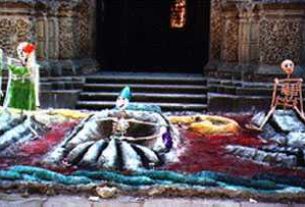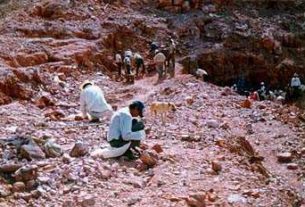Westwords
My exalted editor, spelling coach and inspirational wife of more than 50 years said my chosen subject for this month wasn’t very good so we’ll skip what I thought was an award-winning essay and go directly to questions and answers.
Question: I’ve read about your forthcoming book. What the heck are you doing in Mexico?
Answer: Having a delightful time aging gently; avoiding U.S. winter weather at all costs, saving the children’s inheritance; seeing something different, learning something new, regarding every day as an adventure. Mexico is a big country. Come on down.
Question: Sounds like you’ve been a few places. Is it safe to drive in Mexico?
Answer: Based on experience, it’s safer than New York City, Atlanta and parts of Boise, Idaho. Buy Mexican insurance. Don’t play chicken with macho drivers. If a ball rolls onto the road, expect a boy to follow. Save some space on the shoulder for bicycles. Beware of wandering livestock. Learn enough Spanish to comprehend highway signs, especially “curva peligrosa.” Look with respect upon smashed and twisted guardrails and little white memorial crosses at the side of the road.
In Mexico City, take a taxi.
Question: Are Mexico roads as bad as I’ve heard?
Answer: I can only guess what you’ve heard, but Mexico roads are better than their general reputation. There are places too tough for our VW bug. Village cobblestones will put a bounce in your shock absorbers. Highway potholes tear up tires. Speed bumps, just a little lower than the Sierra Madres, have been accused of jumping up and knocking off mufflers and tailpipes.
There are roads I wouldn’t travel on Bubba’s burro but, for the most part, Mexico highways are functional at moderate speeds. Some require patience. Many are good. Most toll roads are very good. Some are four-lane. Twos and fours are expensive.
Come try the roads. They lead to marvelous sights — vast deserts that seem endless, modern cities, dense, green jungles, deserted beaches, banana plantations and beautiful raspberry farms, volcanoes, dry lakes, ancient ruins, quaint villages, spectacular mountains and fancy resorts where you can leave your money. Mexico is a variety show.
Question: Is it safe to drink the water?
Answer: Maybe yes? But probably no. Buy bottled water. Or Seven-Up. Some gringo subdivisions have better water than Chicago. Some homes have purification systems that make suspicious tapwater safe. Assume that restaurants with firm floors serve purified water and clean ice. Mexican friends swim in Lake Chapala — but we don’t.
Question: I’ve heard horror stories about theft. Any experiences?
Answer: Yes. We have endured two hits on our Mexico home while we were away. Banditos scaled the wall, cut and bent steel security bars, smashed glass and made a mess. Losses included a small TV, microwave, toaster oven, boombox, surge protector, socks, underwear and a box of dominos. Among semi-valuables ignored were Christmas CDs, including haunting Scottish bagpipes.
Police officers live across the street. Seven investigated the most recent break-in. El capitán suggested installation of an electric fence to discourage the trend. Second-in-command reasoned that if bandits will cut steel bars, they’ll also cut hot wires. An argument ensued. For once, I just listened. We settled for new, pull-down curtains in heavy, gray steel. We added dual alarms and a short prayer.
Question: Does Mexico really depend on money sent from the United States?
Answer: It helps. Guillermo Ortiz, high chief and captain of the Bank of Mexico, told us just the other day that $17 billion poured into this country from that country in 2004. He was smiling when he said it. That’s a 30 percent increase in one year.
That means Mexicans in the U.S. either got a big raise or there are more Mexicans in the U.S. sending part of their pay to relatives and friends still south of the border.
Revenue sharing is important to the Mexican economy, second only to the exportation of oil. Tourism ranks third, ahead of manufacturing, produce and mariachi hats.
Question: Reading about Mayan ruins as day trips from Cancun. You been there?
Answer: Yes, and we found Tulum and Chichen Itza to be inspiring sights. Some look at ruins and see old stone buildings and crumbling walls. We saw vivid reminders of a sophisticated civilization that had created monumental ceremonial structures, some astronomically aligned. (Wow, big words).
As ruins go, Tulum is relatively simple but particularly impressive, perched atop limestone cliffs that overlook a beautiful white sand beach and the blue-green Caribbean. Walls on three sides are 10 or 15 feet high and 15 or 20 feet thick — enough to discourage even lakeside banditos.
You probably know that the great pyramid at Chichen Itza is built over an earlier pyramid. A passage way leads up into the main room of the older temple. Inside is a jaguar throne. There was drama in that blueprint.
The ancient Maya created other conversation pieces in addition to stunning stone craftsmanship. They are credited with rubberized rainwear, a precise calendar and a counting system starting with zero. I don’t know how they did it but the Mayans supposedly developed dogs that didn’t bark and honey bees that didn’t sting. Think about it.
Question: I’ve been told Mexico is a very religious country. Do Mexicans ever enjoy party time?
Answer: There are various definitions of religion and partying. Do Mexicans drink? Indeed they do. We know one man who rides his horse to the neighborhood bar each Saturday afternoon. The horse waits patiently and always knows the way home, no matter the degree of darkness when Pedro eventually staggers out the swinging doors.
It seems to me many happy people live in Mexico. They have invented an unfair numbers of holidays, fiestas and extended celebrations. Some are religious, some political, some historical, some family. Some include music and parades, colorful costumes and dancing in the streets. Most include fireworks. Many include food and drink.
Guadalajara, for example, celebrates October with more than 400 events — everything from concerts to cockfights. I suppose a few conclude with “amen” but most include at least a taco and a tequila.
Question: Is there some kind of joke about Mexicans mowing their lawns?
Answer: Sometime during the dry season, which mysteriously follows the rainy season, grass, weeds, leaves and vines along roadsides and farming residue in the fields have been known to turn brown. Instead of chopping, raking, bagging and carrying away the dead stuff, Mexicans set it on fire. With a semi-controlled burn, they clear the decks for the change of seasons. When we see smoke billowing, we smile and say “They are mowing their lawn.”
Question: I knew you in Washington, D.C. You’re getting smarter in old age. Any coaching tips?
Answer: Try not to sneeze while getting a haircut.


